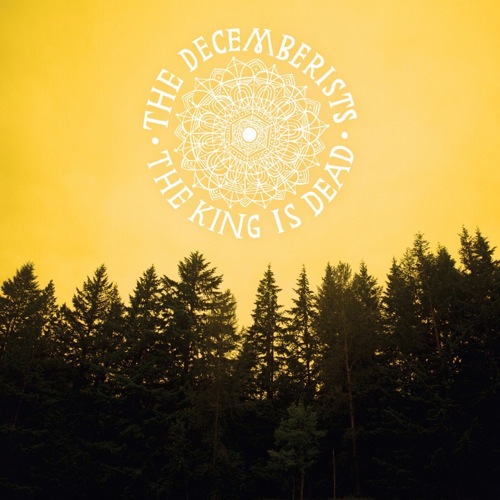 The Decemberists
The DecemberistsThe King Is Dead
Score: 74
Portland indie-art-folk group The Decemberists, now in their 11th year and more popular than ever, will release their sixth LP, currently available for streaming, later this month. After 2009’s lackluster The Hazards of Love, it’s hard not to have some trepidation mixed into the excitement for the group’s new album. Fortunately, while The King Is Dead isn’t a masterpiece on the level of, say, The Crane Wife, it’s certainly a solid album.
The King Is Dead is, most noticeably, very distinctly influenced by the country genre. There’s a lot less going on with regards to instrumentals than what is usual for Decemberists, and The King Is Dead is certainly not orchestral in nature, but that’s not to say that the instrumental side of the album is by any means bad. The entire album is extremely well put together, as should be expected from The Decemberists, and while there are no sweeping crescendos or waves of sound, the album works well for what it is. The album varies quite acceptably between tracks, ranging from the delicate guitar of “January Hymn” to the pressing low-end of “This Is Why We Fight,” and the end result is more than pleasing.
Really, what The King Is Dead lacks are the overly dramatic bits that The Decemberists recorded so impeccably on previous albums. The dynamic level stays quite constant through most tracks, despite its varying from one to the next, and at its worst, it lends a monotonous quality to the music. It certainly drains the album of a significant amount of emotion, as, in that regard, the album tends to rely solely on the excellently sung lyrics.
Colin Meloy’s voice is in top form throughout The King Is Dead. It doesn’t hurt that, unlike on The Hazards of Love, it’s unburdened by ill-advised guest vocalists or serious instrumental missteps. Instead, Meloy’s voice is generally left to its own devices - with great success. Meloy uses his rich, plaintive tones to great effect, such that they fit in quite well even with the most heavily folk-themed of The King Is Dead’s tracks. The well-composed combination of Meloy’s voice and the album’s range of instrumentals certainly helps - though when they’re working, Meloy’s vocals could all but stand alone.
The King Is Dead is simultaneously more forlorn and less cohesive than much of The Decemberists’ other work - it’s more imagery than it is the individual tales that made up The Crane Wife or the overarching epic of The Hazards of Love. Its level of lyrical success also, unfortunately, varies. Tracks like single “Down by the Water” succeed in drawing the vivid images Meloy is aiming for as he sings lines like “Sweet descendants rabble around / The pretty little patter of a seaboard town,” while tracks like “Dear Avery,” while successful in their own way, don’t quite manage to marshal their imagery to the same degree.
More than anything, it seems like The Decemberists lack any sort of direction. The band began diverging from its usual routine after The Crane Wife, producing the simple, though occasionally quite powerful Always the Bridesmaid series, the immensely conceptual and highly experimental Hazards of Love, and now the restrained, country-heavy King Is Dead. The Decemberists is certainly becoming increasingly unpredictable, and whether that is any sort of improvement for the band is highly debatable. The King Is Dead is significantly more successful than The Hazards of Love, and it is definitely a good album, but The King Is Dead certainly could have been significantly better, given the band’s earlier work.
This post is tagged 70-79, The Decemberists